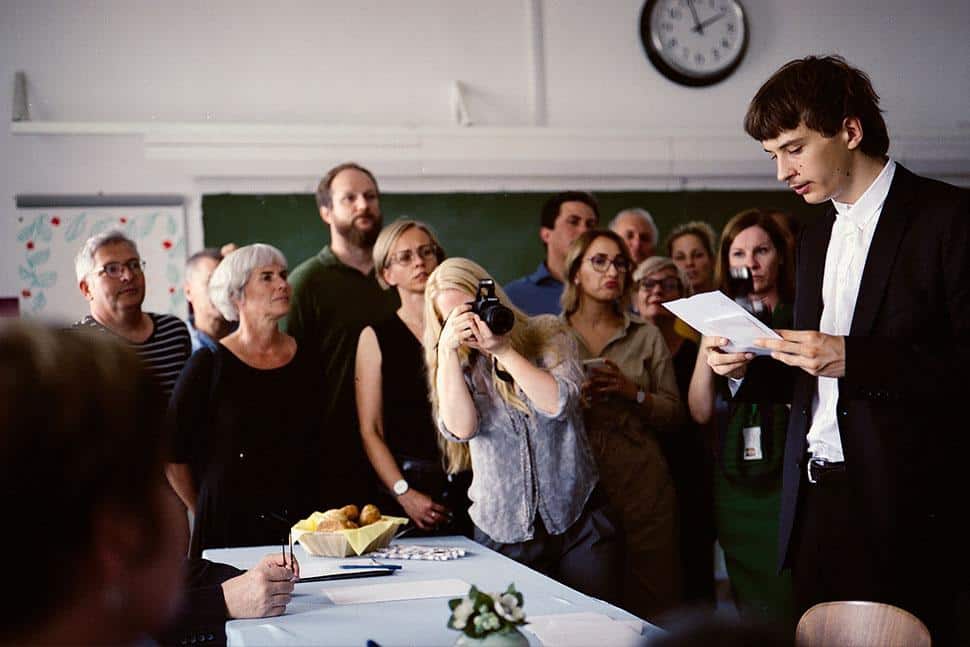Explanation for Everything may sound like the title of an insufferable American indie film, but it is, in fact, the third film by Gábor Reisz. The Hungarian director burst into the film scene with his charming first feature, For Some Inexplicable Reason (VAN valami furcsa és megmagyarázhatatlan 2014). The follow-up Bad Poems (Rossz Versek) was released in 2018 to widespread acclaim. I liked it and have seen the film several times, but I still expressed some doubt about it during the Hungarian Film Week in 2019. My thoughts then might have been slightly uncharitable for a film with so many ideas, but I felt that, occasionally, the director tried too hard. and resorted to gimmicks
The world premiere of Reisz’s third feature took place in the Orizzonti section of the Venice Film Festival. When Alberto Barbera mentioned the film during the festival presentation, he almost apologised that the film was not screened in the competition. The film is set during the summer in Budapest. Ábel (Gáspár Adonyi-Walsh) is 18 and about to take his final exams. He is distracted by the fact that he is in love with his best friend, Janka (Lilla Kizlinger).1 Lilla Kizlinger is known for her part in Bence Fliegauf’s Forest – I See You Everywhere, which rendered her a Silver Bear for Best Actress in 2021. She, on the other hand, has a crush on the history teacher, Jakab (András Rusznák).
We first meet some young people drinking and partying in the streets. One of them is Ábel, and we will soon be acquainted with his parents, György, who is an Orbán supporter (István Znamenák) and Judit (Krisztina Urbanovitz). The former is an architect who sees colleagues and friends leaving Hungary for Denmark and other Western European countries. When Ábel comes home and says that he failed his history exam, György explodes and tells his son that his life is ruined. In an apparent attempt to divert the attention, Ábel tells his father about a comment Jakab made about a national symbol on his jacket. That simple act sets several wheels in motion, and soon, all hell will break loose.

Is there an Explanation for Everything?
In Péter Gothár’s classic Time Stands Still (Megall as idö 1982), there is a scene when a boy grabs the microphone during a public event and starts shouting. Even though the act has nothing to do with politics, it still has political ramifications. The point of the reference is not merely that István Znamenák played Dini in that film, but above all, that Reizs’s film tackles the complex topic of a society where everything can and will be politicised, no matter the context. The director co-wrote the script with his former professor, Éva Schulze. I’m not sure how significant her impact was, but this is unquestionably Reisz’s most mature film to date, both in writing and execution.
The film’s origin derives from the government’s reorganisation of the University of Theatre and Film Arts. Something that sparked numerous protests from Reisz and virtually everyone important in the film community. The scriptwriters managed to find a way of depicting the situation in Hungary without stooping to caricatures. György was already annoyed with Jakab, who he considers too left-wing. Did Ábel fail the exam because of Jakab´s bias? Explanation for Everything takes place during eight days and is divided into chapters with mischievous titles. We will follow the action from several viewpoints, creating a Rashomon mosaicked but clear view of the proceedings. The film doesn’t really explain everything, thankfully, but the original title, Magyarázat mindenre, provides a clever pun.
The film is also a testimony to how the production conditions for films have changed in Hungary. When the aforementioned debut feature was screened at the Hungarian Film Week, it was a film that the organisers were very proud of, and there were even buses available to take the spectators to extra screenings. Explanation for Everything didn’t get any money from the film fund, and it’s not mentioned at all on the National Film Institute webpage. There was a single post on Facebook after the film won the Orizzonti competition, but more stress was on the fact that Poor Things was shot in Hungary. The funding for the film came from Slovakian MPhilms and Proton Cinema through Júlia Berkes.
The look of the film is, in many ways, reminiscent of Romanian cinema by directors like Puiu and Muntean. Kristóf Becsey’s handheld camera provides a straightforward, artless perspective that serves the film perfectly. The strongest aspect of the film might still be the acting. In a story that could easily have been rife with clichés, the tight and nuanced script is expertly handled by all the thespians involved. Znamenák might have the trickiest part, but Rusznák, as the, frankly, annoying teacher, is perfect, as well.
Explanation for Everything is one of the best films of the year and a film that I can’t recommend enough. It is also scattered with brilliant dialogue and one-liners. Even though the film’s theme is ostensibly local, its universality is all too apparent.
